- Back to Home »
- Tsarnaev pleads not guilty in blast
- NEW: Tsarnaev appeared to have "no remorse whatsoever," witness says
- NEW: About 30 bomb survivors were in court to watch his arraignment
- Boston Marathon suspect pleads not guilty to 30 counts, including 4 killings
- One of the victims was an 8-year-old boy
Boston (CNN) -- Boston Marathon bombings suspect Dzhokhar Tsarnaev faced more than two dozen survivors of that attack Wednesday as he pleaded not guilty to killing four people and wounding more than 200.
Tsarnaev is charged with 30 federal counts stemming from the April 15 attack, when a pair of bombs went off near the finish line of the packed course. Three people died in the blasts, including an 8-year-old boy, while a Massachusetts Institute of Technology police officer was killed three days later at the start of the dramatic chase that led to Tsarnaev's capture.
MIT police lined up outside the courthouse as the hearing neared its end Wednesday afternoon in a show of solidarity with their fallen comrade, Sean Collier. Inside, about 30 survivors of the attack watched as Tsarnaev appeared before U.S. Magistrate Judge Marianne Bowler.
It was the first time he had been seen in public since his arrest. The 19-year-old was dressed in an orange jail jumpsuit, his hair long and shaggy, his left arm in a cast. He was wounded in the pursuit -- during which his brother, Tamerlan, was killed -- and he appeared to have an injury to the left side of his face.
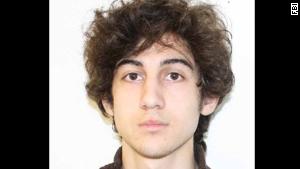 Tsarnaev looks at spectators in court
Tsarnaev looks at spectators in court 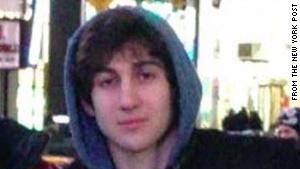 Tsarnaev 'seemed disinterested' in court
Tsarnaev 'seemed disinterested' in court 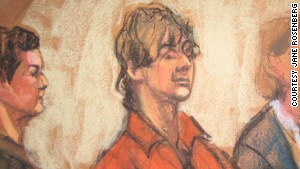 Inside the Tsarnaev court hearing
Inside the Tsarnaev court hearing 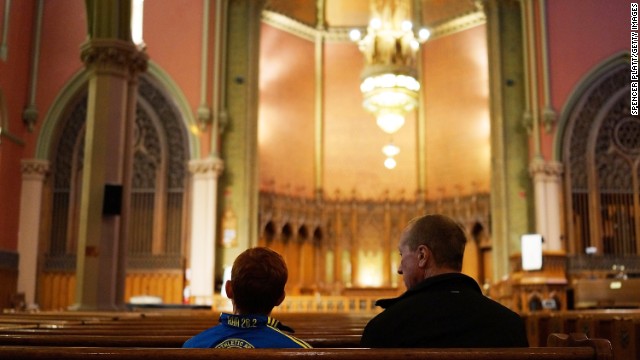 A young runner, left, stops by a Boston church blocks away from the scene of the bombings. The blasts exploded near the Boston Marathon's finish line on Monday, April 15, killing three people and injuring more than 170 others. See all photography related to the Boston bombings.
A young runner, left, stops by a Boston church blocks away from the scene of the bombings. The blasts exploded near the Boston Marathon's finish line on Monday, April 15, killing three people and injuring more than 170 others. See all photography related to the Boston bombings. 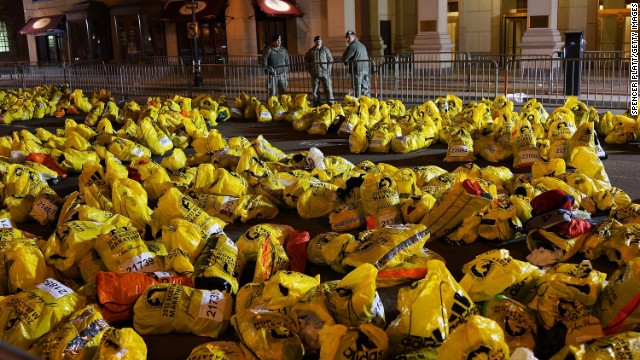 Unclaimed finish line bags litter the ground near the bombing sites. A day after the terror attack, authorities warned city residents to keep their guard up amid a massive investigation into the bombings.
Unclaimed finish line bags litter the ground near the bombing sites. A day after the terror attack, authorities warned city residents to keep their guard up amid a massive investigation into the bombings. 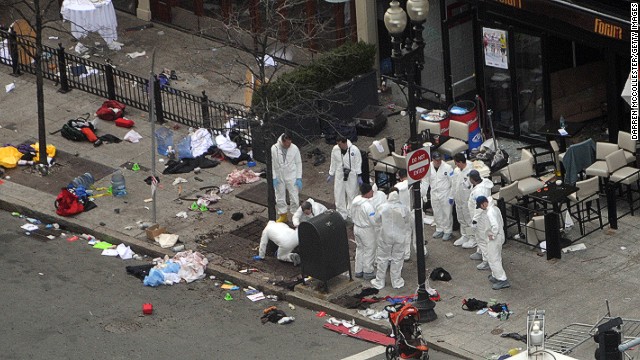 Investigators work at an area of the crime scene on Boylston Street on April 16.
Investigators work at an area of the crime scene on Boylston Street on April 16. 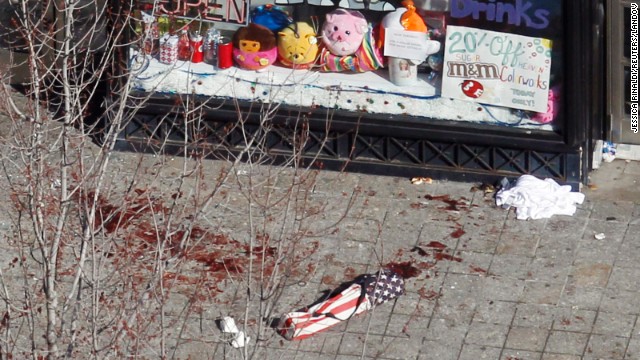 Blood is visible on a sidewalk in front of a Boston store on April 16.
Blood is visible on a sidewalk in front of a Boston store on April 16. 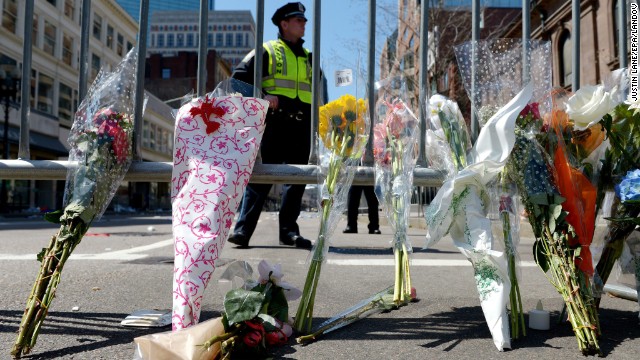 Flowers rest against a police barricade down the street from the Boston Marathon's finish line on April 16.
Flowers rest against a police barricade down the street from the Boston Marathon's finish line on April 16. 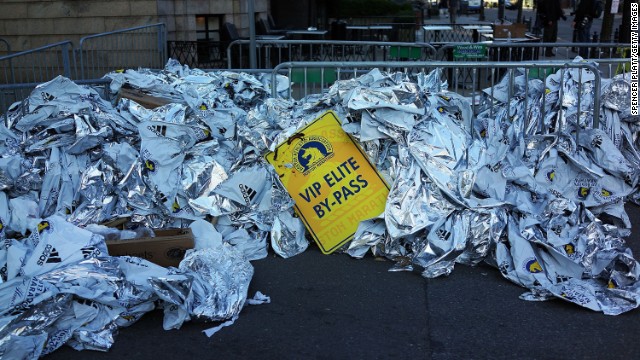 Unused thermal blankets for runners are piled high near the scene of the bombings on April 16.
Unused thermal blankets for runners are piled high near the scene of the bombings on April 16. 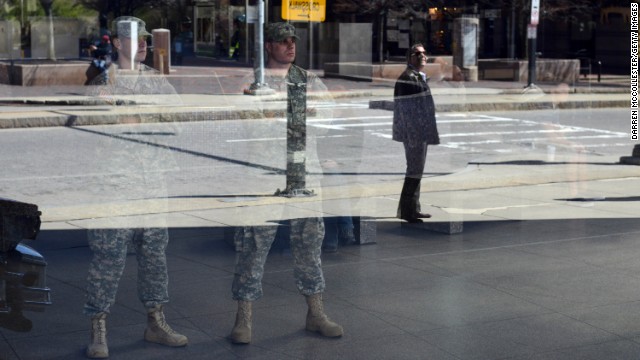 National Guardsmen look out from inside Boston's Back Bay Station on April 16.
National Guardsmen look out from inside Boston's Back Bay Station on April 16. 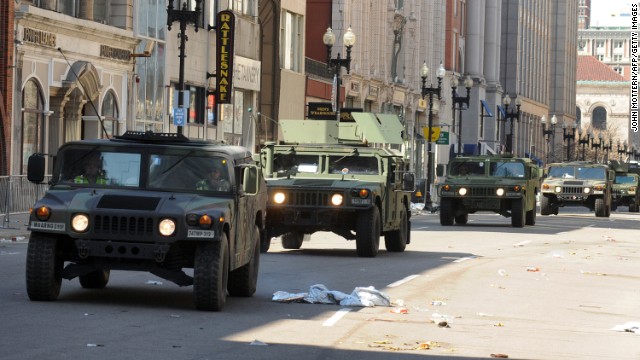 U.S. military Humvees move down deserted Boylston Street on April 16.
U.S. military Humvees move down deserted Boylston Street on April 16. 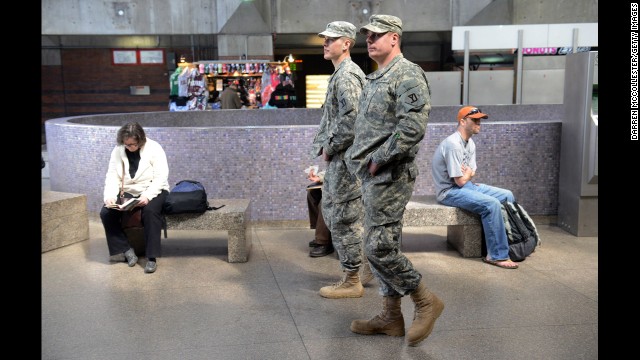 National Guardsmen patrol the Back Bay Station on April 16 as security remains tight in Boston.
National Guardsmen patrol the Back Bay Station on April 16 as security remains tight in Boston. 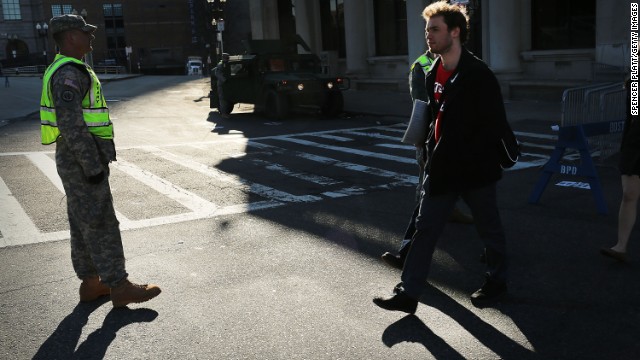 Pedestrians pass National Guard troops at a roadblock on April 16.
Pedestrians pass National Guard troops at a roadblock on April 16. 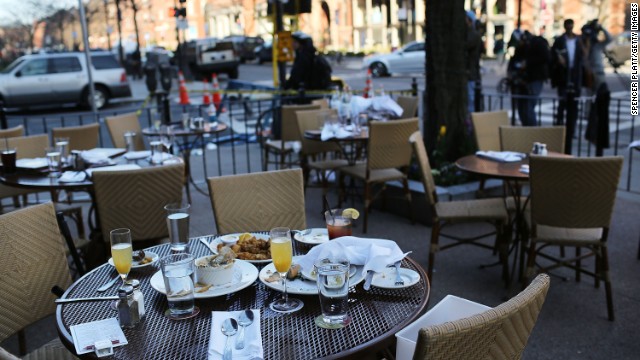 The unfinished meals of fleeing customers are left on tables at an outdoor restaurant in Boston on April 16.
The unfinished meals of fleeing customers are left on tables at an outdoor restaurant in Boston on April 16. 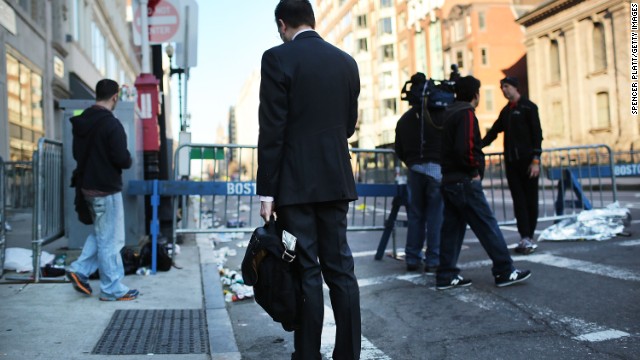 People congregate at a security gate near the blast scene on April 16.
People congregate at a security gate near the blast scene on April 16. 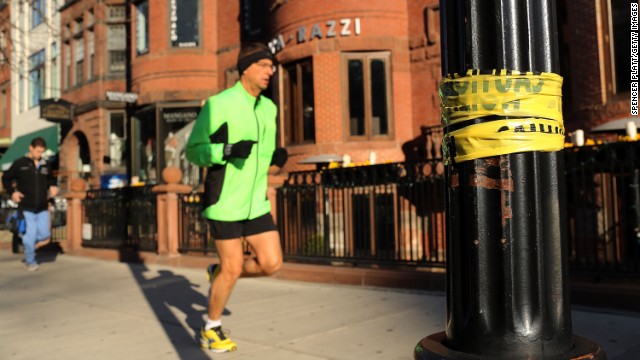 A man jogs down a street near the scene of the bombings on April 16.
A man jogs down a street near the scene of the bombings on April 16. 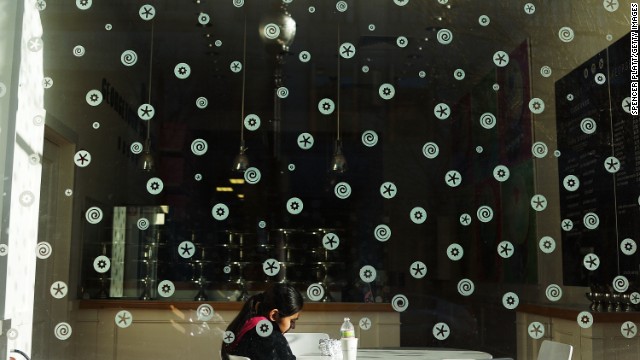 A woman sits alone at a Boston cafe on April 16.
A woman sits alone at a Boston cafe on April 16. 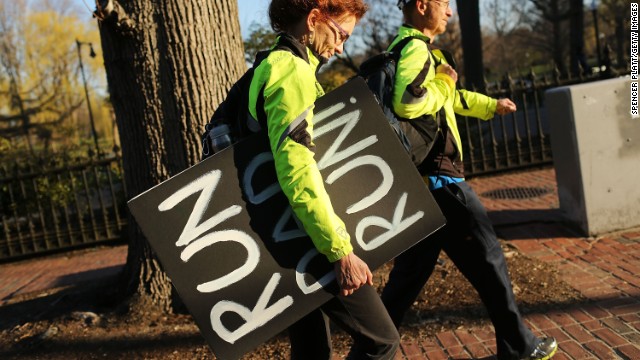 A woman carries a sign she made to support her runner husband near the scene of the bombings.
A woman carries a sign she made to support her runner husband near the scene of the bombings. 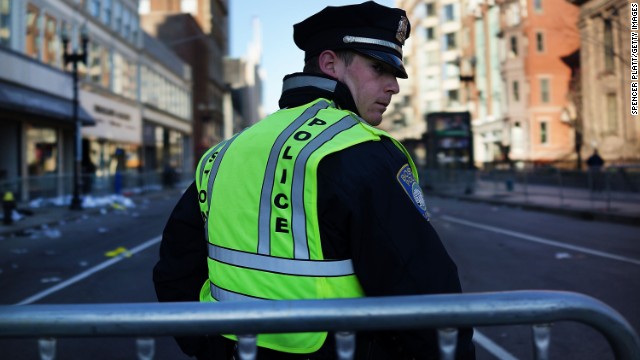 A police officer stands on duty in Boston on April 16.
A police officer stands on duty in Boston on April 16. 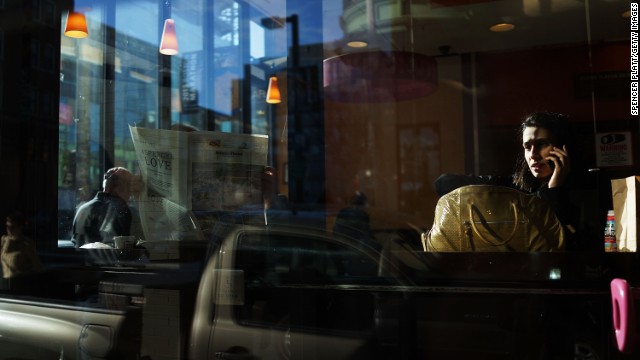 People have breakfast at a Boston cafe on April 16.
People have breakfast at a Boston cafe on April 16. 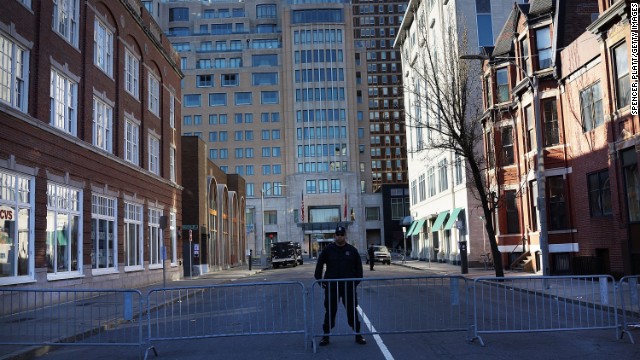 A Boston police officer stands near blast sites April 16.
A Boston police officer stands near blast sites April 16. 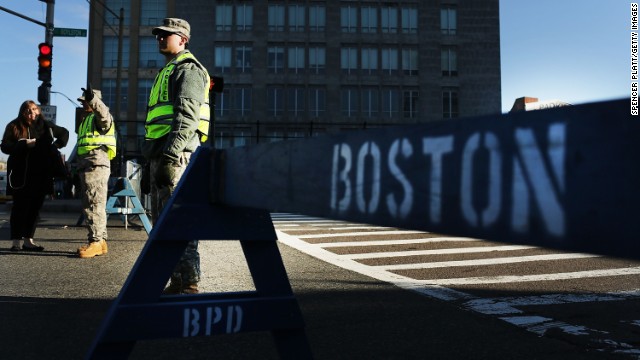 National Guard troops man a roadblock April 16.
National Guard troops man a roadblock April 16. 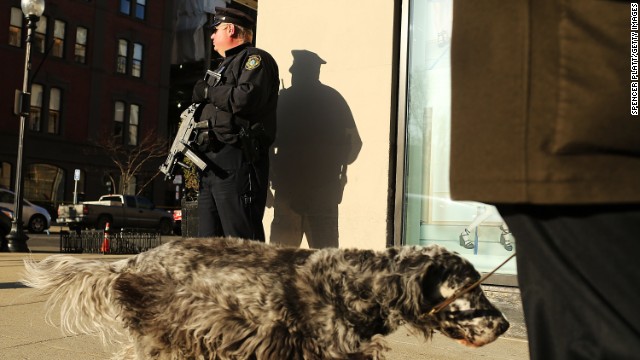 A Boston police officer is heavily armed blocks away from the scene of the bombings.
A Boston police officer is heavily armed blocks away from the scene of the bombings. 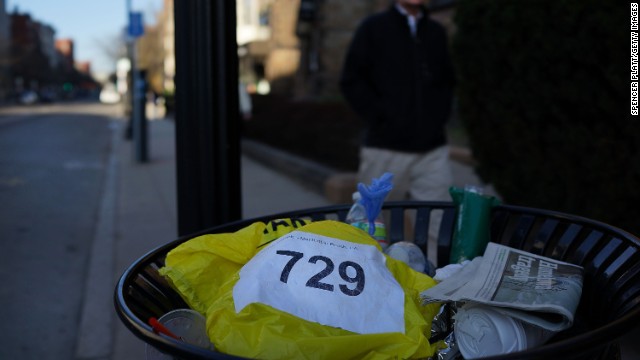 A runners bib lies discarded April 16. See all photography related to the Boston bombings.v
A runners bib lies discarded April 16. See all photography related to the Boston bombings.v 
1

2

3

4

5

6

7

8

9

10

11

12

13

14

15

16

17

18

19

20

21
 Boston: The aftermath of terror
Boston: The aftermath of terror Tsarnaev looked back at the spectators in the packed courtroom before entering his plea -- and to Liz Norden, whose two sons each had a leg amputated after the attacks, he appeared to smirk.
"He did have some family members in the courtroom, so I don't know," Norden told CNN. "But to me it was, like, no remorse whatsoever."
Norden said her sons "really don't want to hear about it," but she said she had to be in court for them.
"I want to see what happened to my family that day," she said. "I watch my boys struggle every day, and it breaks my heart. And I just want to see who or why it happened and who caused it."
Tsarnaev faces a total of 30 federal charges in the bombings and subsequent pursuit through the streets of suburban Boston. He appeared in court for arraignment.
Prosecutors said Wednesday they expect to call between 80 and 100 witnesses in a three- to four-month trial.
Tsarnaev was found in a motorboat dry-docked in the backyard of a Watertown, Massachusetts, home, covered in blood from bullet wounds sustained during a manhunt that brought Boston to a standstill.
Victims and their families tend to appear in person at trials at two key moments, said CNN legal analyst Paul Callan: at the arraignment and at the verdict and sentencing.
"It's not something they want to watch on television. They want to be there," he said.
The death penalty
Boston Mayor Thomas M. Menino is confident about getting a conviction, he told the Boston Herald on Tuesday. "We should lock him up and throw away the key."
But that won't be enough for many victims and their families. And prosecutors will likely go for the death penalty. Seventeen of the charges offer that possibility.
Last bombing victim leaves hospital
Callan said Tsarnaev's lawyers could argue that he was under the "mesmerizing influence" of Tamerlan, his older brother. But Callan believes one piece of evidence will make it easy for prosecutors to shoot down that argument: While he lay bleeding in the motorboat, covered with a tarp, the younger Tsarnaev apparently scrawled his motive for his alleged deeds onto its sides.
"The U.S. Government is killing our innocent civilians," it read. "I can't stand to see such evil unpunished."
"We Muslims are one body, you hurt one you hurt us all."
"Now I don't like killing innocent people it is forbidden in Islam but due to said (unintelligible) it is allowed."
Timeline: The bombing, manhunt and investigation
"Stop killing our innocent people and we will stop."
"That would indicate that he was not under his brother's influence, that he had an independent thought process and dedication to this movement on his own," Callan said.
Prosecutors will use the writings to argue intent -- that Tsarnaev knew what he was doing.
Indictment blow by blow
Tsarnaev is charged with killing three spectators in the bombings and a MIT police officer ambushed in his cruiser a few days later. He also is accused of "maiming, burning and wounding scores of others," U.S. Attorney Carmen Ortiz has said.
But that is merely a handful of the charges.
Add to those use of a weapon of mass destruction resulting in death, deadly bombing of a public place, use of a firearm during a crime of violence causing death, carjacking, bodily harm. The list goes on.
The indictment details the planning that allegedly went into the attacks. Tamerlan Tsarnaev bought 48 mortars, it says.
It also says that Dzhokhar Tsarnaev downloaded a copy of Inspire magazine, which included instructions on building IEDs using pressure cookers and explosive powder from fireworks.
Pressure cooker bombs were used in the Boston Marathon attacks.
Three days after the attacks, on April 18, the FBI released photographs of the brothers, identifying them as bombing suspects.
Hours later, they drove their Honda Civic to the MIT campus, where they shot and killed Collier and attempted to steal his service weapon, the indictment says. They were allegedly armed with five IEDs, a Ruger P95 semiautomatic handgun, ammunition, a machete and a hunting knife.
The indictment alleges that late that night, the brothers carjacked a Mercedes in Boston using guns.
Soon after, police discovered the Tsarnaevs at an intersection in nearby Watertown, where they tried to apprehend them, but the brothers fired at the police and used four IEDs against them, the 74-page indictment alleges.
Police tackled the elder brother and were trying to handcuff him when Dzhokhar Tsarnaev got back into the Mercedes and drove it at the officers, according to the indictment. He wound up running over his brother, "contributing to his death."
The younger Tsarnaev escaped, abandoned the car nearby and hid in the boat, where he remained until the owner noticed him and called police.
Health improved
In late May, Dzhokhar Tsarnaev was allowed to have a phone conversation with his mother, Zubeidat Tsarnaev, who lives in the Russian republic of Dagestan.
She recorded it and played it back to CNN affiliate ITN, based in Britain.
She asked whether he was in pain.
"No, of course not. I'm already eating and have been for a long time," Dzhokhar told her.
He assured her that he was getting much better.
Deborah Feyerick and Ross Levitt reported from Boston; Matt Smith wrote from Atlanta. CNN's Ben Brumfield contributed to this report.







